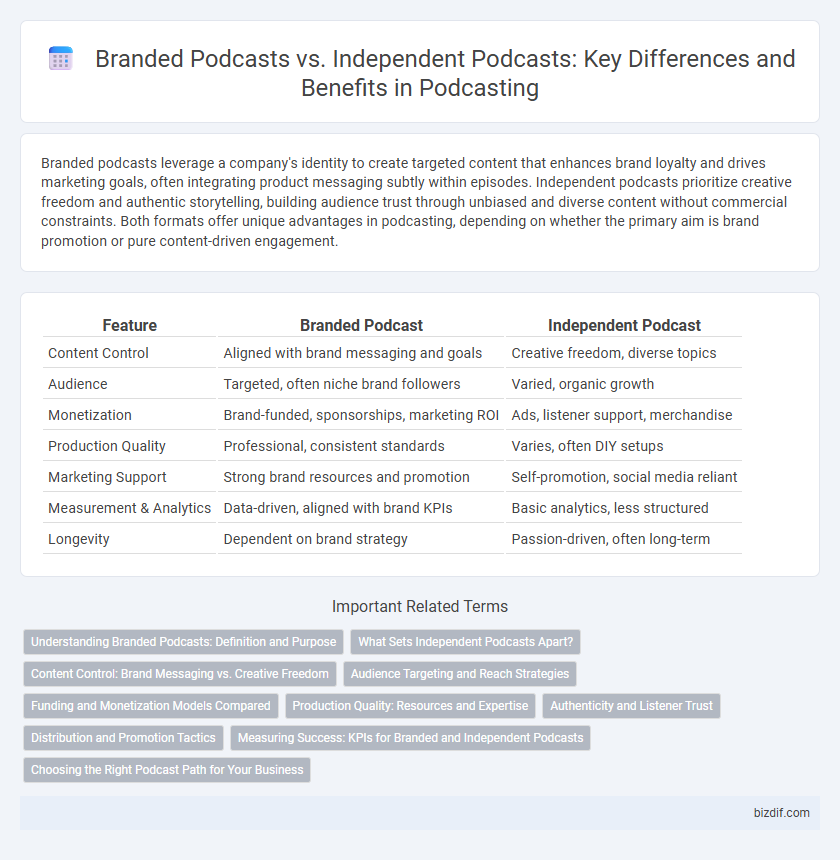Branded podcasts leverage a company's identity to create targeted content that enhances brand loyalty and drives marketing goals, often integrating product messaging subtly within episodes. Independent podcasts prioritize creative freedom and authentic storytelling, building audience trust through unbiased and diverse content without commercial constraints. Both formats offer unique advantages in podcasting, depending on whether the primary aim is brand promotion or pure content-driven engagement.
Table of Comparison
| Feature | Branded Podcast | Independent Podcast |
|---|---|---|
| Content Control | Aligned with brand messaging and goals | Creative freedom, diverse topics |
| Audience | Targeted, often niche brand followers | Varied, organic growth |
| Monetization | Brand-funded, sponsorships, marketing ROI | Ads, listener support, merchandise |
| Production Quality | Professional, consistent standards | Varies, often DIY setups |
| Marketing Support | Strong brand resources and promotion | Self-promotion, social media reliant |
| Measurement & Analytics | Data-driven, aligned with brand KPIs | Basic analytics, less structured |
| Longevity | Dependent on brand strategy | Passion-driven, often long-term |
Understanding Branded Podcasts: Definition and Purpose
Branded podcasts are audio series produced by companies to promote their brand values, products, or services while engaging audiences with relevant content. These podcasts serve as a strategic marketing tool designed to build brand loyalty, increase customer engagement, and drive direct sales through storytelling and expert insights. Understanding the purpose of branded podcasts is key to leveraging them for authentic audience connection and effective brand communication.
What Sets Independent Podcasts Apart?
Independent podcasts distinguish themselves through authentic storytelling and creative freedom, often fostering deeper connections with niche audiences. Unlike branded podcasts, they prioritize content originality and unfiltered perspectives without commercial influence. Their grassroots approach enables greater experimentation in format and subject matter, enhancing listener loyalty and engagement.
Content Control: Brand Messaging vs. Creative Freedom
Branded podcasts offer companies full control over content to ensure messaging aligns precisely with brand identity and marketing goals. Independent podcasts prioritize creative freedom, allowing hosts to explore diverse topics and styles without corporate constraints. The balance between brand messaging and creative freedom directly influences audience engagement and authenticity in the podcasting space.
Audience Targeting and Reach Strategies
Branded podcasts leverage company resources to target niche audiences through data-driven strategies, maximizing reach via cross-promotion and existing customer bases. Independent podcasts often rely on organic growth, community engagement, and social media to attract diverse listeners, prioritizing authentic content over extensive marketing. Both formats utilize SEO optimization and listener analytics to refine audience targeting and expand their reach effectively.
Funding and Monetization Models Compared
Branded podcasts typically receive funding directly from a sponsoring company, allowing for consistent budgets driven by marketing objectives and brand alignment, while independent podcasts often rely on diverse monetization models such as listener donations, merchandise sales, crowdfunding, and targeted advertising to sustain operations. Branded podcasts leverage corporate backing for high-quality production and strategic promotion, whereas independent podcasts depend on building loyal audiences and generating revenue through platform partnerships and direct audience support. The funding model significantly impacts content control, with branded podcasts aligning closely with brand messaging and independent podcasts maintaining editorial freedom to diversify revenue streams.
Production Quality: Resources and Expertise
Branded podcasts often benefit from substantial budgets and access to professional studios, experienced producers, and advanced sound equipment, ensuring high production quality. Independent podcasts may face resource limitations but leverage creative control and flexibility to craft unique audio experiences. Expertise in audio editing, storytelling, and sound design plays a crucial role in distinguishing the production quality between branded and independent podcast productions.
Authenticity and Listener Trust
Branded podcasts often face challenges in establishing authenticity due to their promotional nature, which may lead to skepticism among listeners. Independent podcasts, driven by genuine passion and creative freedom, typically cultivate stronger listener trust by delivering unfiltered content. Authentic storytelling and transparent motives significantly enhance audience engagement and loyalty in podcasting.
Distribution and Promotion Tactics
Branded podcasts leverage established company channels such as websites, newsletters, and social media platforms to maximize targeted distribution and promotional impact. Independent podcasts rely heavily on organic growth through podcast directories, influencer collaborations, and community engagement to build a loyal audience base. Strategic use of SEO, cross-promotion with other podcasts, and paid ads enhances discoverability for both formats, though branded podcasts benefit from larger marketing budgets and existing brand recognition.
Measuring Success: KPIs for Branded and Independent Podcasts
Branded podcasts primarily measure success through KPIs like brand awareness, audience engagement, lead generation, and return on investment (ROI), leveraging metrics such as downloads, listener retention, and conversion rates to align with marketing goals. Independent podcasts focus on KPIs including subscriber growth, listener loyalty, episode downloads, and social media interaction to gauge community impact and content resonance. Both types benefit from tracking audience demographics and feedback to refine content strategy and maximize listener value.
Choosing the Right Podcast Path for Your Business
Selecting between a branded podcast and an independent podcast depends on your business goals and target audience engagement. Branded podcasts offer direct control over messaging and seamless integration with your marketing strategy, enhancing brand awareness and loyalty. Independent podcasts provide creative freedom and authenticity that can attract a dedicated niche audience, fostering deeper connections and organic growth.
Branded podcast vs Independent podcast Infographic

 bizdif.com
bizdif.com